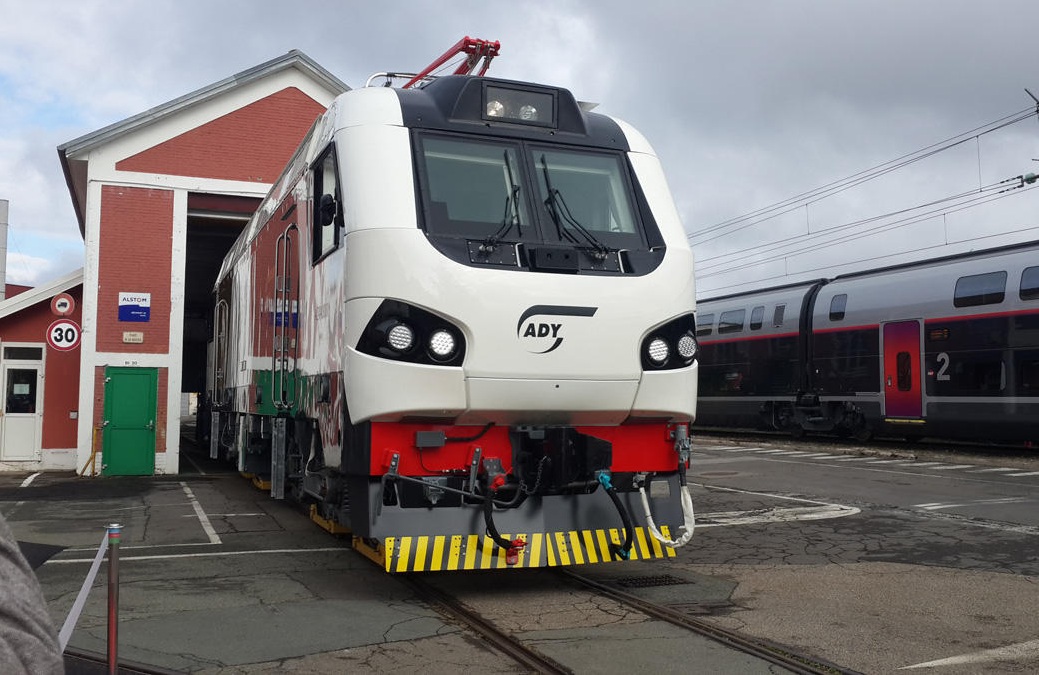As Azerbaijan looks to increase its overland transportation capacity and upgrade its railways infrastructure, high-speed capabilities have become a top priority. The country's national rail transport operator, Azerbaijan Railways, is now waiting for its first Prima AZ4A locomotive, high speed passenger car, which is scheduled to arrive in Baku by this year’s end.
Designed and constructed by the French manufacturer Alstom, the Prima AZ4A locomotive was unveiled in the French city of Belfort, on October 9.
"We are very pleased to deliver our first multi-purpose Prima locomotive to Azerbaijan and become a part of ambitious projects to increase transit link between the Black and Caspian Seas, and between Russia and Iran," said Bernard Peille, Alstom’s Managing Director for the company’s Western and Central Asia Cluster, while addressing a presentation of the newly-constructed locomotive, according to a company press release.
The unveiling in Belfort kick-started what will be a month-long trip for the car train, which will head to the Belgian city of Antwerp on October 12. Once arriving in Belgium, the Prima will be loaded onto ship and sent to Azerbaijan via the seas, arriving in Baku some time in December.
The car was developed per Azerbaijan Railways’ technical requirements, and in compliance with technical standards maintained by the Commonwealth of Independent States’ Euro-Asian Council for Standardization, Metrology and Certification, known as GOST1.
Prima AZ4A is capable of running at 160 kilometers per hour (100 miles per hour), almost twice as fast as the Russian-produced locomotives currently used in Azerbaijan. With features that allow it to run in an energy saving mode, the locomotive is considered one of the most versatile in the world. The cars have an automatic train operations system that use global positioning systems, or GPS, to help control operations, run diagnostics, and assist with traffic safety.
The deal between Azerbaijan Railways and Alstom was for 10 passenger and 40 freight cars, worth 288 million euro, and signed in 2014 by officials from both countries during a visit to Baku by then-French President Francois Hollande. The deal also included the creation of a service depot that will provide technical support and maintenance services, as well as train Azerbaijani Railways personnel on how to operate the train.
"We expect that this agreement will boost the development of the railway network inside Azerbaijan, and also will strengthen relations with neighboring nations," said Rahman Mustafayev, Azerbaijan's Ambassador to France, on Monday during the official ceremony in Belfort.
While the first of 10 passenger cars is already constructed and on its way to Baku, the first of the 40 freight cars are not expected until mid-2018. Known as AZ8A, these locomotives rank amongst the most powerful in the world, using 8,800 kW of power, running at speeds of 120 km/hr (75 mi/hr), while hauling up to 9,000 tons.
The freight cars are being assembled at Alstom’s manufacturing hub in Astana, Kazakhstan. They are scheduled for use along the Baku-Tbilisi-Kars (BTK) railway, which is scheduled to go online later this month. The railway link connects Azerbaijan, Georgia and Turkey, while bypassing Armenia and cutting across the South Caucuses to make transportation throughout Eurasia more efficient.
Operating at an initial capacity of about one million persons and 6.5 million tons of freight, the BTK line is expected to help cut transit time in between China and Europe in half, from 25-30 days to just 15 days.
Azerbaijan’s railway system includes over 2,900 km (1,800 mi) of tracks. About 1,270 km (790 mi) are electrified at 3 kilovolt (kV), using direct current (DC). In 2006, a program to overhaul the entire system was put into place, which included gradually changing the power system from direct to alternating current (AC).
"The work on the railways’ renovation, as well as the [implementation of] the Baku-Tbilisi-Kars project are set to open a new chapter in the development of Azerbaijani rail transport," Ambassador Mustafayev concluded.







 Iran's senior military leaders described the drone and missile attack on Israel on April 14 night as “successful".
Iran's senior military leaders described the drone and missile attack on Israel on April 14 night as “successful".
 The number of evacuees from flooded areas in Kazakhstan has reached 97,852 people, including about 32,856 children since March 27.
The number of evacuees from flooded areas in Kazakhstan has reached 97,852 people, including about 32,856 children since March 27.
 Iranian President Ebrahim Raisi warned Israel that it would face a "real and extensive" response if it makes any "mistake" following Tehran’s missi...
Iranian President Ebrahim Raisi warned Israel that it would face a "real and extensive" response if it makes any "mistake" following Tehran’s missi...



